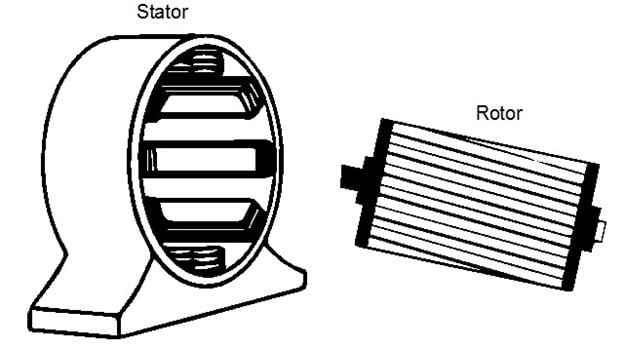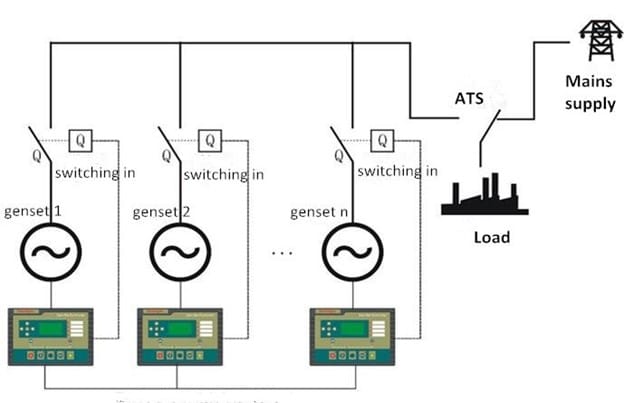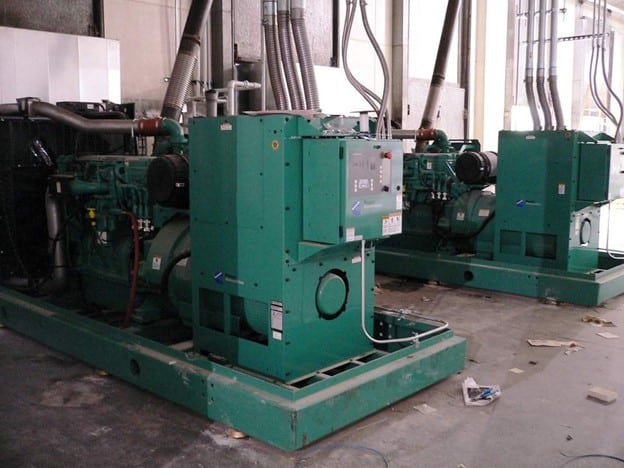Diesel generators stand as the cornerstone of uninterruptible power supply in industrial operations. Their unwavering reliability, exceptional fuel efficiency, and ability to deliver consistent power have solidified their status as an indispensable factory asset.
However, procuring a diesel generator requires a deep understanding of the nuances involved to make informed decisions that align precisely with your factory’s needs. This concise provides an expert perspective on the crucial aspects of purchasing a factory diesel generator.
Diesel Generators: A Brief Overview
At its core, a diesel generator is a power generation system fueled by diesel. It comprises several intricate components, each pivotal to its overall performance and reliability:
- Engine
- Alternator
- Fuel system
- Cooling system
- Control panel
- Exhaust system
These components work in synergy to produce the electrical power required for your factory’s continuous operation, allowing you to complete a wide range of tasks, whether sustaining ongoing work, promoting products, or generating free business cards at the office.
At the heart of every diesel generator lies a meticulously engineered diesel engine, a marvel of precision and efficiency. Diesel engines operate on the principles of internal combustion, which involve two crucial processes:
- Compression Ignition: Diesel engines are classified as compression-ignition engines. In this process, air is drawn into the cylinder and compressed to extremely high pressures, often exceeding 500 PSI. This compression significantly raises the air temperature.
- Fuel Injection: Diesel fuel is injected directly into the highly compressed air. Due to the high temperature, the diesel fuel spontaneously ignites upon contact with the hot, compressed air. This ignition drives the engine’s pistons and generates mechanical energy.
Advantages of Diesel Engines
Diesel engines offer several distinct advantages that render them exceptionally suitable for industrial applications:
- High Torque Output: Diesel engines produce high torque levels, making them ideal for powering heavy machinery commonly found in factory environments. This high torque ensures robust performance even under heavy loads.
- Fuel Efficiency: Diesel engines inherently exhibit greater fuel efficiency than their gasoline counterparts. This efficiency stems from their higher compression ratios and the energy density of diesel fuel. In other words, a diesel generator can deliver more electricity per unit of fuel consumed, resulting in significant cost savings over time.
Alternator (Synchronous Generator) – Electromagnetic Induction Principles
The alternator, also known as a synchronous generator, plays a pivotal role in converting the mechanical energy produced by the diesel engine into electrical power. This transformation relies on the principles of electromagnetic induction, specifically the interaction between the rotor and stator:
- Rotor-Stator Interaction: Within the alternator, a rotor rotates, creating a rotating magnetic field. This magnetic field interacts with stationary stator coils, inducing an alternating current (AC) voltage.

Voltage Regulation and Waveform Quality
Diesel generators often employ Automatic Voltage Regulators (AVRs) to control the generator’s output voltage. These systems continuously monitor and adjust the generator’s voltage to ensure it remains within specified limits, even in the face of load variations or changes in engine speed.
Technical Specifications and Performance
Understanding the technical specifications and performance characteristics of diesel generators is fundamental to selecting the right one for your factory. Key considerations include:
- Power Ratings and Sizing: Prime power generators are designed for continuous operation as the primary power source, ideal for factories with constant electricity demands. On the other hand, standby power generators serve as backup power sources during electrical outages.
- Overloading Capabilities: Diesel generators often possess the capacity to handle short-term overload conditions, which can be crucial in factory settings where equipment may demand brief surges in power.
Load Factors and Peak Demands
Load profile, balancing, and surge capacity are other elements to comprehend before selecting the right generator size and capacity:
- Load Profiles: These profiles detail the varying power demands over time, including peak demand periods and periods of reduced consumption. Ensure to analyze load profiles to determine the generator’s size and capacity to support your specific operations.
- Surge Capacity and Load Balancing: Sudden surges in power demand, common during
equipment startup or production spikes, require generators with surge capacity. This capability guarantees uninterrupted factory operations during load spikes.
Fuel Efficiency and Emissions
Fuel efficiency is a critical consideration in industrial operations where fuel costs can be substantial. Key factors include:
- Brake Specific Fuel Consumption (BSFC): BSFC quantifies the fuel consumed per unit of power produced. Diesel engines are known for their favorable BSFC figures, making them an efficient choice for factories seeking to minimize operational costs.
- Combustion Efficiency Improvements: Modern diesel engines employ advanced technologies like common rail injection and turbocharging to enhance combustion efficiency, resulting in improved fuel efficiency and reduced emissions.
- Emissions Control: Compliance with emissions regulations is crucial for environmental responsibility. Diesel generators use emissions control technologies, such as Selective Catalytic Reduction (SCR) and Diesel Particulate Filters (DPF), to minimize harmful emissions and meet stringent standards.
Reliability and Maintenance
Reliability is the bedrock of industrial operations, and it commences with the engine’s robustness:
- Engine Durability and Longevity: The quality of materials and construction significantly influences the durability of engine components like pistons, crankshafts, and cylinder heads. Engines built with high-quality materials and precision machining are more likely to provide long-lasting performance, even though they are considerably expensive compared to cheap alternatives.
- Maintenance Intervals and Practices: Secure maintenance, including oil changes, filter replacements, and inspections, to prevent unexpected breakdowns and ensure the engine’s longevity. Modern diesel generators often feature advanced monitoring systems that track engine performance, facilitating proactive maintenance.
- Redundancy and Backup Systems: For critical factory operations, redundancy is a strategic approach. N+1 configurations, which involve having one or more backup generators, ensure uninterrupted power supply during abrupt generator downtime.
Paralleling and Load Sharing
Consider implementing load-sharing strategies like paralleling systems in scenarios where a single generator may not suffice. Paralleling multiple generators allows them to work together, sharing the load evenly. It is instrumental when the factory’s power demand fluctuates, or additional capacity is needed.

Installation and Integration
The installation of a diesel generator requires completing numerous steps. Among other things, ensure to meet:
- Foundation Requirements: Properly designed and constructed foundations are essential to ensure the stability and vibration control of the generator. Consult with experienced engineers for optimal results.
- Safety Protocols: Adherence to safety protocols during installation is non-negotiable. Ensure all installation procedures follow safety guidelines and local regulations.
Seamless integration of the generator into your factory’s electrical system is also imperative:
- Electrical Connections: Electrical integration involves connecting the generator to the factory’s electrical grid, demanding expertise in electrical systems to avoid compatibility issues.
- Mechanical Compatibility: Ensure the generator is mechanically compatible with existing systems and infrastructure, encompassing exhaust routing and cooling system integration.
Conclusion
The investment in a diesel generator for your factory transcends a mere purchase; it’s a strategic decision that impacts your operations profoundly for years. Arming with a thorough understanding of the technical intricacies delineated in this guide will help you make informed decisions that ensure the provision of reliable, cost-effective, and environmentally responsible power generation for your industrial facility.



